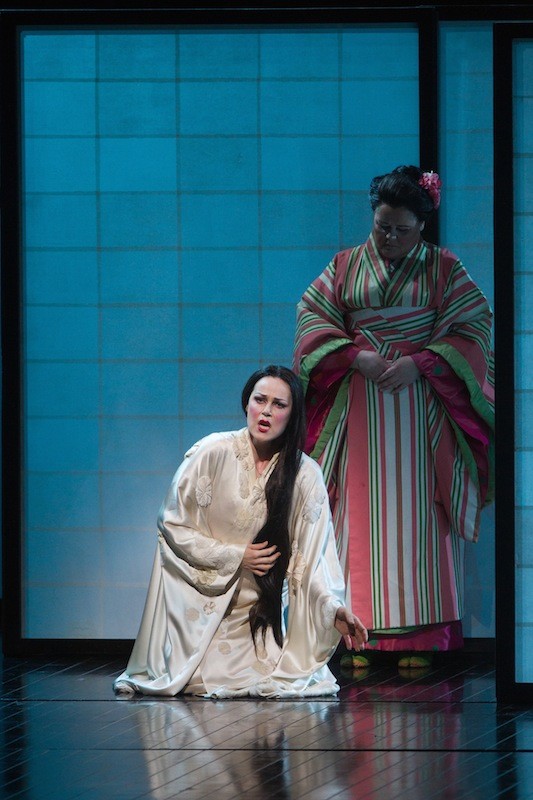| March 20, 2016


| March 20, 2016

“There’s nothing half-way about Madama Butterfly. A star vehicle if there ever was one, it relies heavily on its soprano heroine to carry a performance, both musically and dramatically. A Butterfly can be entirely ordinary, or it can be outstanding, with much of the difference depending on the woman in the title role.
And when excellence extends beyond the name at the top of the bill, we end up with a truly unforgettable performance like the one heard at the Metropolitan Opera Thursday night . . . two of the world’s greatest singing actors in a classic Puccini tragedy, a superb supporting cast, excellent work from the pit, and an evocative staging made this easily one of the preeminent triumphs of the Met’s season.
Opolais sang her first Met Cio-cio-san two years ago to rapturous acclaim, and her interpretation has lost none of its brilliance.
Vocally, her work was admirable, of course, employing an instrument that . . . still has more than enough body to fill out the role. Her rendition of the signature aria “Un bel di” was glowingly sung, soaring in necessary moments but surprisingly intimate, as though she were singing only for herself.
What stood out most was the complete commitment of her acting, accomplished largely through remarkable specificity. Opolais had a precise intention for every line, which she played without reservation. Her surging hope as she examined Pinkerton’s returning ship through a spyglass was painful to watch, intensifying the dramatic irony of the scene to the point that the ensuing Flower Duet had an unusual poignancy.
The arc from Opolais’s first introduction as a nervous young woman to her ultimate breakdown was unnerving to witness. In the final act she looked physically exhausted and her movements become more erratic with every passing moment. After her crushing moment of anagnorisis, the devastating line “Tutto è morto per me” seemed as much a statement of resolve as of resignation, and in her vacant stare one might have detected the makings of a classic bel canto mad scene. What came instead was a wrenching account of her death aria, made more arresting by her achingly human interactions with the puppet that portrays her son.”
Eric C. Simpson – New York Classical Review
“Opolais Shines in Minghella’s ‘Madama Butterfly’ . . . with a splendid Kristine Opolais singing the title role, it is an intense and moving experience no opera lover should miss . . .
The role of Cio-cio-san is a demanding one inasmuch as she is onstage for most of the opera and she must transition vocally a range of emotions from demure bride to physical desire to anxious devotion to despair.
Opolais makes it all believable. In the famous “Un bel di vedremo” aria, Opolais clearly sees in her mind’s eye Pinkerton’s ship arriving in the harbor, her waiting for him at the top of the hill, him calling to her. Her lovely soprano soars, then drops to a pianissimo, never wavering in her conviction of his return for her until the very end.”
Wilborn Hampton – The Huffington Post
“The production is a great showcase vehicle for Puccini’s complex and sophisticated music as well as for the singer in the title role. Kristine Opolais completely inhabited the character and . . . scored a success in her heartbreaking portrayal of a geisha falling for an American sailor who returns with an American wife to claim their child.
Ms Opolais has an expressive voice that she employs skillfully to achieve great effect. Butterfly’s entrance aria showed her in good voice, and she capped it with an extended high note. Her singing was at its best when she sang softly, at the beginning of her love duet with Pinkerton in Act I, and at the end of the magical Flower Duet with her maid, Suzuki, in Act II . . . Ms Opolais excelled with her keen sense of drama and deep connection to music. Her voice sometimes followed the contours of melodies as played by a single instrument with astounding mastery; it was as if her voice became part of the orchestra.
The soprano’s showcase aria “Un bel dì” in this production takes place rather unexpectedly and innocuously as the Butterfly discusses her situation with Suzuki. Ms Opolais sang the aria quietly, and even as the Butterfly reiterated her conviction of Pinkerton’s return, her voice never rose in excessive volume. It was an effective way to convey her belief. Her real tour de force was Butterfly’s extended last scene. As she bid farewell to her child (a puppet skillfully handled by three kuroko), praising him as a gift from heaven who would cross the ocean to a new life, there was not a dry eye in the theater. It was clear from Ms Opolais’s final gesture as she stabbed herself, with Pinkerton’s voice calling to her, that it was her child that was her last thought, as Ms Opolais extended her arm towards the son, and not to the approaching Pinkerton.”
Ako Imamura – Bachtrack.com
July 19, 2025
Andris Nelsons, conductor
September 14, 2025
Giancarlo Guerrero, conductor